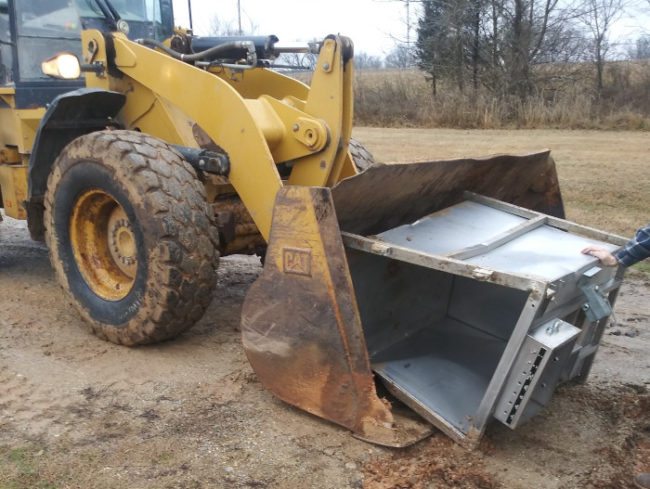
In addition to working with shelters and issuing grants to close down gas chambers, our state directors have taken the fight to their statehouses. Photo by Beverley Vycital/iStockphoto
The euthanasia of homeless companion animals in gas chambers sounds archaic and is inhumane, but the practice is still prevalent in four states—Ohio, Missouri, Utah and Wyoming—where there are fewer than a dozen such chambers in operation.
That’s still too many. Since 2013, the Humane Society of the United States has made it our mission to dismantle every gas chamber in the country. We have helped fund, with incentive grants, the demolition of more than 75 chambers–that’s two-thirds of the total number operating nationwide since we began this work. And this month, we helped one more animal shelter, in West Plains, Missouri, with a financial grant so it could relegate its gas chamber to history. This is the fourth chamber we have closed down in the state so far.
Death in a gas chamber can be painful and excruciating. The animals are placed in the small, dark box, and they may remain conscious for several minutes, terrified and trying desperately to find a way out. Shelters sometimes place multiple animals in the box, despite guidelines that state only one animal should be in the gas chamber at a time, which can lead to more stress and panic for the animals. They may begin convulsing before they lose consciousness, and death can be especially slow to come for animals who are very young or old or sick.
This is no way for any animal to face the end of his or her life. There have even been rare cases of animals surviving the chamber, only to end up alive in a landfill.

This month, we helped one more animal shelter, in West Plains, Missouri, with a financial grant so it could relegate its gas chamber to history. This is the fourth chamber we have closed down in the state so far.Gas chambers are also more expensive than the humane alternative–euthanasia by injection; they pose risk of injury and even death to shelter staff, and they have been condemned for routine shelter euthanasia by the American Veterinary Medical Association, the Humane Society Veterinary Medical Association and every other national animal welfare organization.
It is clear that gas chambers have no place in animal shelters, and we have attacked the problem methodically. In addition to working with shelters and issuing grants to close down chambers, our state directors have taken the fight to their statehouses. Although 46 states no longer use gas chambers, 32 states do not have laws banning them. There’s now a bill in the Ohio Senate that would ban gas chambers (the state still has one operating gas chamber) and we will be putting our might behind passing it.
Lawmakers in Utah (which has six gas chambers, although not all are operational) and Wyoming (which has four operating gas chambers) are considering similar language. We expect bills to be introduced there over the coming year.
Vermont does not have any gas chambers, but this year a bill in the state’s House of Delegates would close a loophole in state law that still allows for their use, thus aligning the law with existing practices of local animal shelters.
Most Americans see cats and dogs as family members, and there is growing momentum nationwide to reduce pet homelessness and work toward higher adoption rates. The HSUS has been at the forefront of the movement, through programs like the Shelter Pet Project, a public awareness campaign that urges would-be adopters to make shelters their first choice when adding a pet to their family; our Shelter Ally Project, which pairs struggling shelters with more successful peers to offer mentorship and save more lives beyond their own facilities; and our Pets For Life program, which helps keep pets with loving families in underresourced areas.
Through our Puppy Friendly Pet Stores program we are helping pet stores partner with local shelters and rescue groups to increase homeless pet adoption and end the problem of puppy mills.
Lawmakers too are moving to recognize companion animals who end up in shelters. Six states, including Ohio, Colorado, California, Georgia, Illinois and Tennessee have designated shelter pets as their state pets. Florida, Kentucky and Virginia will likely do the same this year.
But honoring shelter pets should also come with a commitment to ensure that they are treated with compassion during every stage of their journey, and especially at the end of life. While we recognize that there will always be a need to end the suffering of animals who are experiencing untreatable and severe medical and behavioral challenges, the least we can do is offer the animals a painless death, not the horror of a gas chamber. We congratulate West Plains on taking the important step of eliminating its chamber. Our work to close down gas chambers and reduce pet homelessness will continue full-steam ahead in coming days.
The post Another gas chamber at an animal shelter is banished to history, with a dozen more to go appeared first on A Humane World.
Enviroshop is maintained by dedicated NetSys Interactive Inc. owners & employees who generously contribute their time to maintenance & editing, web design, custom programming, & website hosting for Enviroshop.
